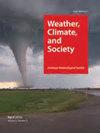The Recognition of Indigenous Peoples in Latin American Climate Governance. A review of Nationally Determined Contributions
IF 1.9
4区 地球科学
Q3 ENVIRONMENTAL STUDIES
引用次数: 1
Abstract
Indigenous Peoples' advocacy has enabled them to position themselves in global debates on climate change. Although the international community progressively acknowledges Indigenous Peoples' contributions to climate action, their effective recognition in national climate governance remains marginal. This article analyses Indigenous Peoples' recognition in the climate governance of Latin American states based on the document analysis of the Nationally Determined Contributions (NDCs) submitted between 2016 and March 2022. A content analysis and frequency analysis was conducted on thirty documents. Mentions related to Indigenous Peoples in the NDCs are increasing; nevertheless, this recognition reproduces the multicultural approach that has characterised Latin American states' legislations and thereby undermines the coherence of climate policy. The references mainly allude to cultural diversity and climatic vulnerability without addressing the ongoing territorial conflicts that mediate the relationship between Indigenous Peoples and states. Nor do the NDCs recognise the right of Indigenous Peoples to participate at the different levels of climate change decision-making processes. Intercultural recognition of Indigenous Peoples and better standards of participation in climate change governance are mandatory. However, States must first promote institutional transformations to address the historical and institutional factors that have produced Indigenous Peoples' climate vulnerability and generate the necessary mechanisms to implement the recognition committed to in the NDCs.土著人民在拉丁美洲气候治理中的地位。国家自主贡献审查
土著人民的倡导使他们能够在关于气候变化的全球辩论中定位自己。尽管国际社会逐渐承认土著人民对气候行动的贡献,但他们在国家气候治理中的有效认可仍然很少。本文基于对2016年至2022年3月期间提交的国家自主贡献(NDCs)的文件分析,分析了拉丁美洲国家对土著人民气候治理的认识。对30份文献进行了内容分析和频次分析。在国家自主贡献中越来越多地提到土著人民;然而,这种认识再现了拉丁美洲国家立法的多元文化方法,从而破坏了气候政策的一致性。这些内容主要暗指文化多样性和气候脆弱性,而没有涉及调解土著人民与国家之间关系的持续领土冲突。国家自主贡献也不承认土著人民参与不同层次的气候变化决策过程的权利。对土著人民的跨文化承认和更好的参与气候变化治理标准是强制性的。然而,各国必须首先促进体制转型,以解决导致土著人民易受气候影响的历史和体制因素,并建立必要的机制来落实国家自主贡献中承诺的承认。
本文章由计算机程序翻译,如有差异,请以英文原文为准。
求助全文
约1分钟内获得全文
求助全文
来源期刊

Weather Climate and Society
METEOROLOGY & ATMOSPHERIC SCIENCES-
CiteScore
3.40
自引率
13.60%
发文量
95
审稿时长
>12 weeks
期刊介绍:
Weather, Climate, and Society (WCAS) publishes research that encompasses economics, policy analysis, political science, history, and institutional, social, and behavioral scholarship relating to weather and climate, including climate change. Contributions must include original social science research, evidence-based analysis, and relevance to the interactions of weather and climate with society.
 求助内容:
求助内容: 应助结果提醒方式:
应助结果提醒方式:


